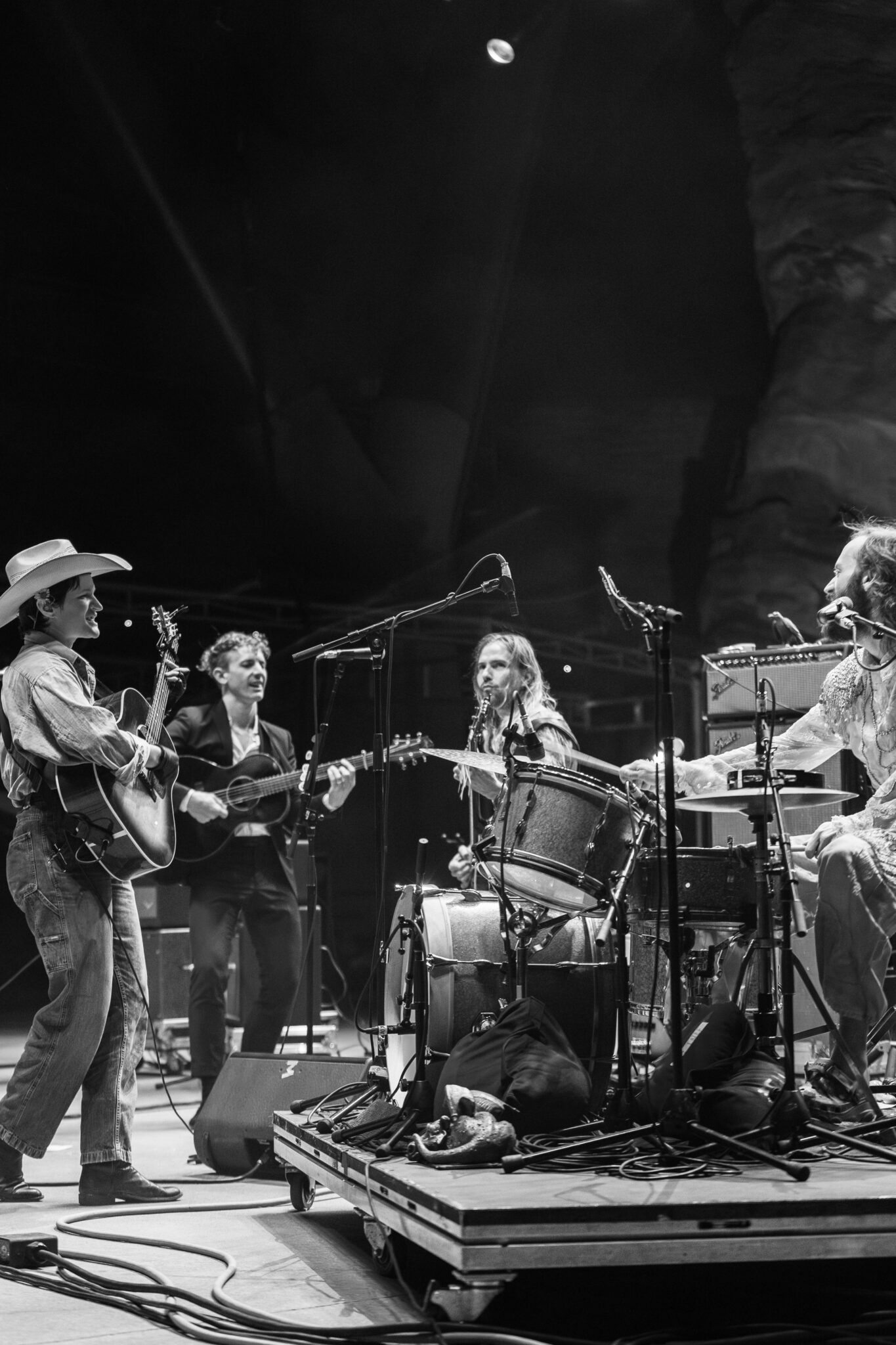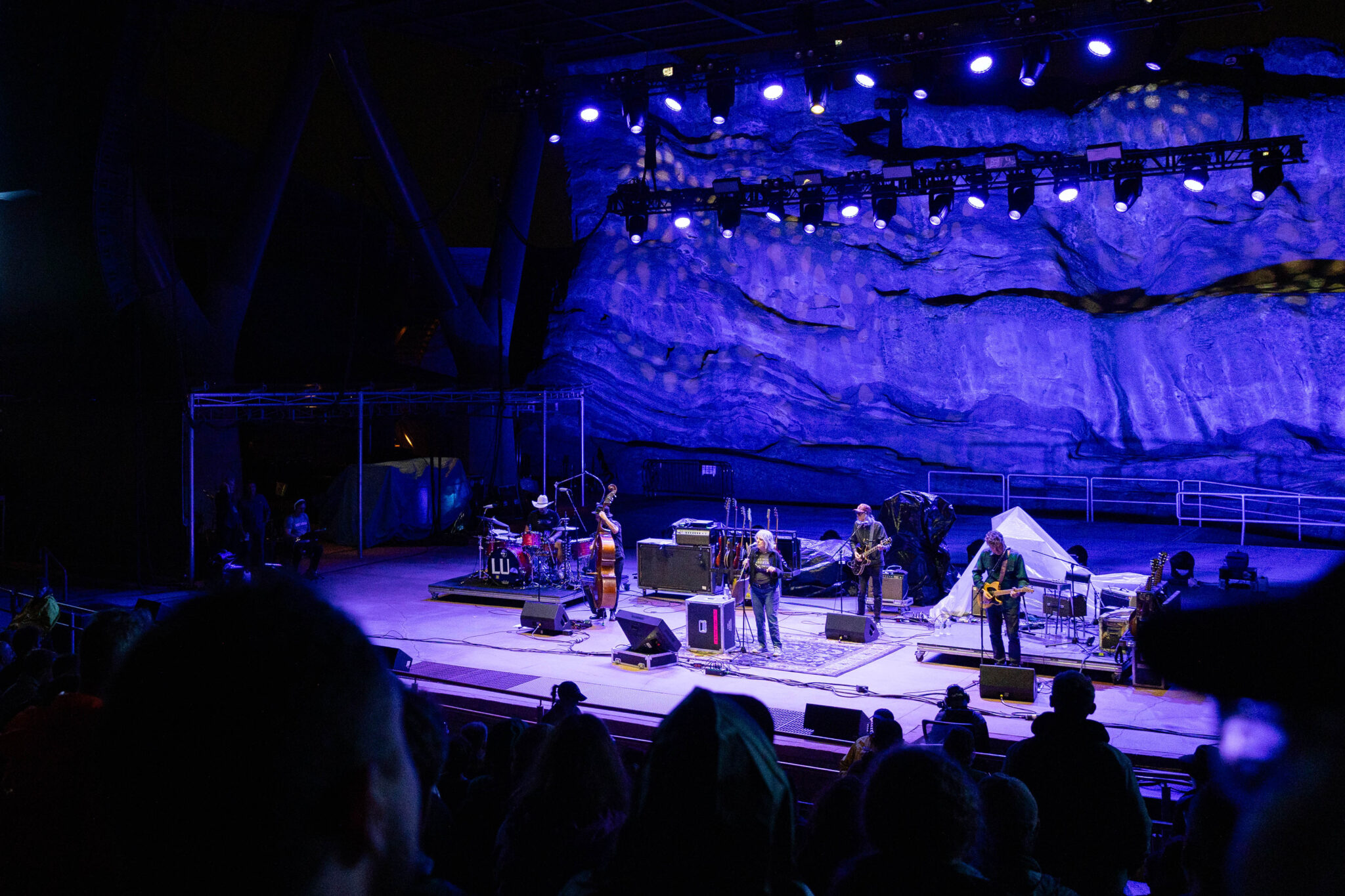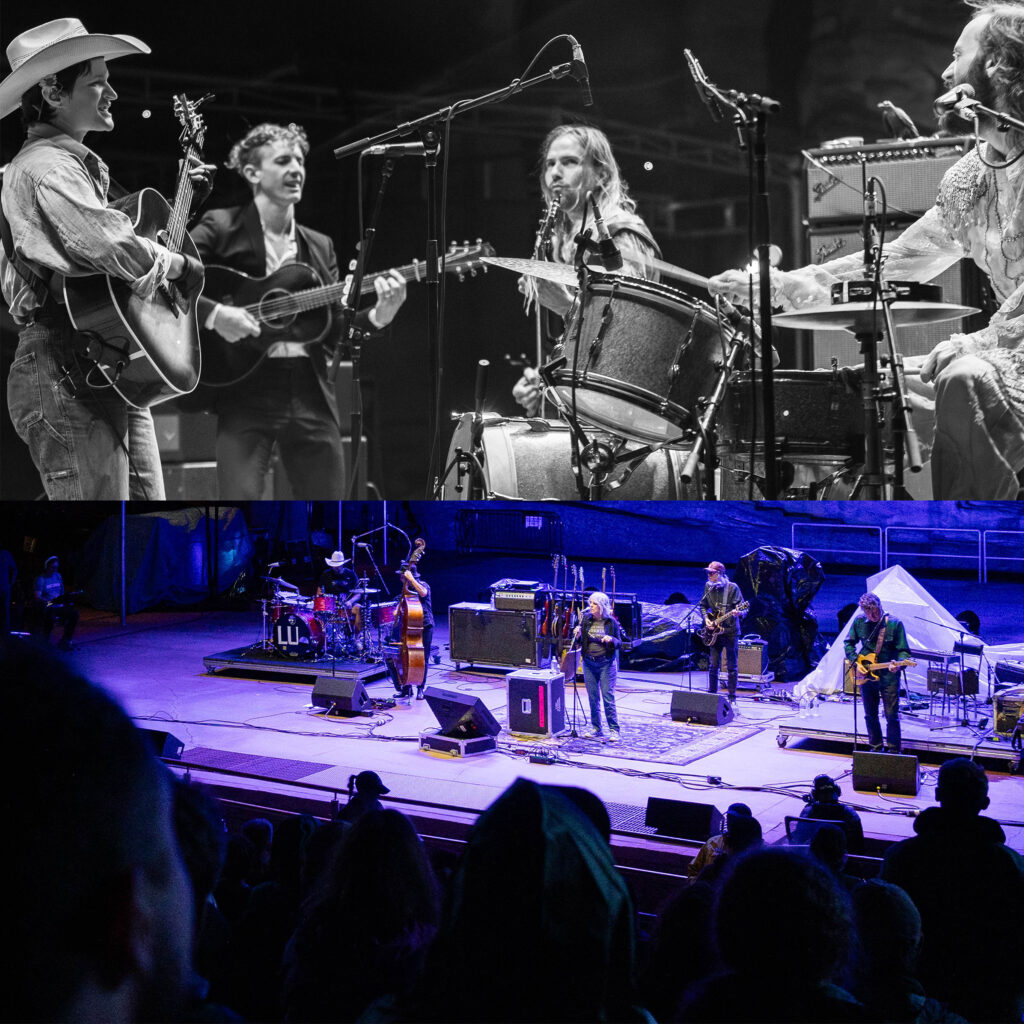This week on eTown, we’re featuring indie-folk-rock band Big Thief and legendary Americana singer-songwriter Lucinda Williams, live from Red Rocks Amphitheater in Morrison, CO. While the theatre of Red Rocks is dramatic in and of itself, this year’s show was electric–-storms brewed overhead before, during, and after. Paired with incredible music from Big Thief and Lucinda Williams, set and setting combined for a night that was nothing short of magic.
Big Thief

Eliciting adjectives like raw, volatile, vulnerable, and intimate, the folk-tinged indie rock of Brooklyn’s Big Thief is shaped by the very personal songwriting of singer/guitarist Adrianne Lenker. She began releasing solo material as a teen in the mid-2000s before partnering with eventual bandmate Buck Meek on a pair of duo EPs in 2014. After forming the four-piece Big Thief, they released their first album, Masterpiece, in 2016. The following year’s Capacity marked their debut on several charts, including the Independent Albums and Americana/Folk charts. In between Lenker solo albums, 2019 brought two Billboard 200-charting Big Thief LPs; U.F.O.F. and Two Hands earned considerable praise in year-end polls, plus a Grammy nomination for Best Alternative Album (for U.F.O.F.). An ambitious double LP, 2022’s Dragon New Warm Mountain I Believe in You, returned them to the Billboard 200.
A Minneapolis native, Lenker learned her first few guitar chords from her father at a young age and began writing songs at ten. After her parents divorced when she was 12, she dedicated herself to music, an endeavor encouraged by her father throughout her teens. She released her first solo material as a teen in 2006. Frustrated by subsequent recording sessions in Nashville, cash-strapped, and with no high school diploma, she applied for a summer program at the Berklee College of Music in Boston with help from her dad. That led to a scholarship to attend full-time. Lenker graduated in 2012 and relocated to Brooklyn.
Soon after arriving in New York, Lenker ran into fellow Berklee alum Meek, whom she remembered from a brief interaction in Boston, where they had shared the same bill at a show. Fast friends and kindred musical spirits, they released two EPs as a duo — A-Sides and B-Sides — in 2014 before forming Big Thief with bass player Max Oleartchik and drummer James Krivchenia. In the meantime, Lenker signed with Saddle Creek, which released her solo album Hours Were the Birds that same year.
The quartet’s first album, Masterpiece, followed on Saddle Creek in 2016, a year that also saw them make appearances at South by Southwest Festival and in support slots on tours with Eleanor Friedberger, Yuck, Frankie Cosmos, and M. Ward. They made their national TV debut with a performance on Late Night with Seth Meyers in March 2017. Big Thief’s second album, Capacity, arrived that June and reached the Top 20 of the Billboard Heatseekers, independent, Americana/folk, and vinyl charts.
After touring in support of Capacity, including a headlining run and dates with Conor Oberst, Meek released a self-titled solo album on Keeled Scales. A solo Lenker followed up with the spare Abysskiss via Saddle Creek later in 2018. In early 2019, Lenkertoured with Abysskiss producer Luke Temple, and Meek opened a dozen North American dates on a solo acoustic tour by Jeff Tweedy.
Back with Big Thief, their third straight album with producer Andrew Sarlo (Nick Hakim, Hand Habits), the more exploratory U.F.O.F., marked the band’s debut for 4AD in May 2019. They spent much of the rest of the year touring North America and Europe, including stops at Norway’s Oya Festival and the U.K.’s Green Man Festival before issuing their fourth album, Two Hands. Recorded just days after their sessions for U.F.O.F., the group headed to the remote Sonic Ranch Studios in Texas with Sarlo to lay down the tracks. The sparsely populated area filtered into their sound — they recorded the entire album live with few overdubs, giving it a rawer, sparser sound than U.F.O.F. Both records entered the Top Ten of the Independent Albums chart as well as the lower half of the Billboard 200. As the year came to a close, Big Thief received a Grammy nomination for Best Alternative Music Album for U.F.O.F.
With production by Krivchenia, who had contributed additional production to their debut, the sprawling double album Dragon New Warm Mountain I Believe in You was recorded in four different locations: California’s Topanga Canyon, Tuscan, the Colorado Rockies, and the Catskills. After being whittled down from 45 to 20 songs, it arrived on 4AD in February 2022 and reached a career-high number 31 on the Billboard 200. It was followed in July 2023 by the 7″ “Vampire Empire” b/w “Born for Loving You.”
Lucinda Williams

Lucinda Williams’ music has gotten her through her darkest days. It’s been that way since growing up amid family chaos in the Deep South, as she recounts in her candid new memoir, Don’t Tell Anybody the Secrets I told You. Over the past two years, it’s been the force driving her recovery from a debilitating stroke she suffered on November 17, 2020, at age 67. Her masterful, multi-Grammy-winning songwriting has never deserted her. To wit, her stunning, sixteenth studio album, Stories from a Rock n Roll Heart, brims over with some of the best work of her career. And though Williams can no longer play her beloved guitar – a constant companion since age 12 – her distinctive vocals sound better than ever.
“I’m singing my ass off,” she told Vanity Fair in February, following her first European tour since 2019. The love emanating from audiences and her musical family onstage and in the studio exemplify the healing power of music, says Williams. In 2020, she spent a week in intensive care, followed by a month in rehab before returning home. The blood clot on the right side of her brain impaired the left side of her body’s motor skills, forcing her to relearn some of the most basic of activities, like walking. In July 2021, she played her first gig, opening for Jason Isbell at Red Rocks. She began seated in a wheelchair, but soon she was upright. “Just the energy of the audiences being so welcoming and warm and the band playing so great and being so supportive gave me so much strength,” Williams relates. “I figured, ‘Hell, all I have to do is stand up there and sing. How hard can that be?”
Soon after touring with Isbell, she returned to the studio. “Writing had been part of my rehabilitation,” says Williams. “It didn’t occur to me to stop and not do anything.” During those long months working with physical therapists and regaining mobility and strength, Williams turned to notebooks of partial lyrics and jotted down some new ideas. She also began collaborating on songs with her husband, manager, and co-producer Tom Overby. The pair’s successful collaborations on several tracks from Williams’ critically acclaimed previous effort, Good Souls Better Angels (released in 2020 and nominated for two Grammy Awards) opened her up to cowriting – “it just expands things,” Williams says.
But post-stroke, she had to revise her own songwriting process, since she could no longer play guitar. “My process has always been to come up with some lyrics, then get the guitar and come up with a melody and some kind of structure,” Williams relates. “Once I get that, then I’d go back and edit the lyrics and add more. Pretty much like when you write and revise a story, except the guitar is added to it. It was very rare that I’d ever write all the lyrics completely without the guitar.”
As they worked on new songs, Williams and Overby enlisted New York singer-songwriter Jesse Malin, whose 2019 album, Sunset Kids, they co-produced. Williams’ longtime road manager, Travis Stephens, a veteran guitarist in several Nashville bands, also jumped in to help. “Like Jesse, Travis is a singer and a songwriter, so he threw his bit in and that led to the co-writing of some songs,” says Williams. “I was comfortable writing with them. Jesse knows me pretty well now, so he was able to anticipate certain things when we worked together – the same with Tom and Travis. I could contribute the melody and all.”
Recording sessions began in November 2021 and – as Williams’ strength increased, continued into 2022. She and Overby rejoined Ray Kennedy, coproducer and engineer of her landmark Car Wheels on a Gravel Road (1998), with whom she reunited to cut Good Souls Better Angels. In addition to Williams’ longtime touring guitarist Stuart Mathis, joining the mix were drummer Steve Ferrone (Tom Petty & the Heartbreakers), keyboardist Reese Wynans (the Stevie Ray Vaughan & Double Trouble vet who appeared on Essence), bassist Steve Mackey (Dolly Parton), and pedal steel/guitarist Doug Pettibone, who played with Williams earlier in her career. “Since I couldn’t teach the band the songs on guitar, I would sing it to give an idea of the feel and the vibe,” says Williams. “We’d do it a few times until we got the right groove. It was really challenging because I wasn’t playing guitar. But sometimes when things are challenging like that, good stuff can come out of it.”
And it certainly did! The band rocks out on the album’s jubilant opening track “Let’s Get the Band Back Together,” which features a gang of background singers, including Margo Price and Buddy Miller. Inspired by “that need for community after all the isolation of the pandemic,” Williams offers, the song is “about getting old friends together again who’d drifted apart.” Price also joins her on the bluesy protest “This Is Not My Town.”
The evocative “New York Comeback” also includes guest vocalists – Bruce Springsteen and Patti Scialfa. A Lucinda Williams fan, Springsteen joined her onstage in London a few years back, and he and Scialfa had wanted to contribute to a Williams album for some time. With Wynans on B3 and the Pettibone-Mathis guitar attack, the musical setting perfectly matches the theme of “Comeback,” as well as on the catchy story-song “Rock N’ Roll Heart,” to which Springsteen and Scialfa also contributed vocals. Says Williams, “Having Bruce and Patti on these songs feels really great. It’s just so cool!”
Another musical hero of Williams, the late Tom Petty is the subject of the elegiac “Stolen Moments.” Williams, who’d toured with Petty in 1999, played his last Hollywood Bowl shows before his sudden death in October 2017. “Tom was a down to earth, sweet, loving person, and I miss his music but I miss him more,” she relates. “I wrote this song after he passed away. I was just heartbroken, and I’m still reeling.”
Another fallen musician, Bob Stinson, founding lead guitarist of the Replacements, inspired “Hum’s Liquor.” “Tom came up with that,” says Williams, of her husband, a Minneapolis native who lived near the liquor store. Overby witnessed from his window Stinson’s daily morning visits, which eventually cut the former Replacement’s life short. “It haunted me,” Overby relates, “and when I read Bob Mehr’s biography of the band and learned about his childhood abuse, it explained a lot.” Tommy Stinson added vocals to the track, which “was really emotional,” says Williams. “We told him it’s a tribute to his brother,” Overby adds, and “Tommy loved the song.” (The album is dedicated to Bob Stinson, “a true rock n roll heart.”)
Williams’ own rock n roll life is reflected in several of the album’s most moving ballads. The bittersweet “Last Call for the Truth” finds her asking for “one more taste of my lost youth,” while on “Jukebox,” her corner-bar Wurlitzer with “Patsy Cline and Muddy Waters” offers solace when she’s “going crazy with the sound of my own voice.” Angel Olsen contributes backing vocals on the latter, and vocalist Siobhan Maher Kennedy appears on the former. The haunting “Where the Song Will Find Me” is beautifully orchestrated with layers of violin and cello, played and arranged by Lawrence Rothman. And the ode to perseverance, “Never Gonna Fade Away,” is – like Williams’ live performances – further testimony to the redemptive power of music.
Through all the hardships Williams faced in 2020 – a destructive tornado damaging her new home in Nashville, being sidelined by the pandemic, and then the catastrophic stroke – her music kept her going and continues to bring her more laurels. The past year has seen Williams honored by BMI for her songwriting, her induction into the Austin City Limits Hall of Fame, and a Grammy Week tribute at the Troubadour, with her songs performed by a diversity of Americana artists. She duetted with Willie Nelson on Billy Joe Shaver’s “Live Forever,” which won a Grammy in February for Best Country Performance. On her birthday in January she performed at a sold-out show in Belfast, Ireland. “I was so glad I was there when I turned 70,” she relates. “The audience sang ‘Happy Birthday,’ Travis brought a birthday cake out onstage, and we took it on the bus and all had a piece of cake. Afterwards, I was so inspired I started writing a song about Northern Ireland.”
As she promises on the powerful last track of Stories from a Rock n Roll Heart–one of the best albums of her career–Lucinda Williams is “never gonna fade away.”
